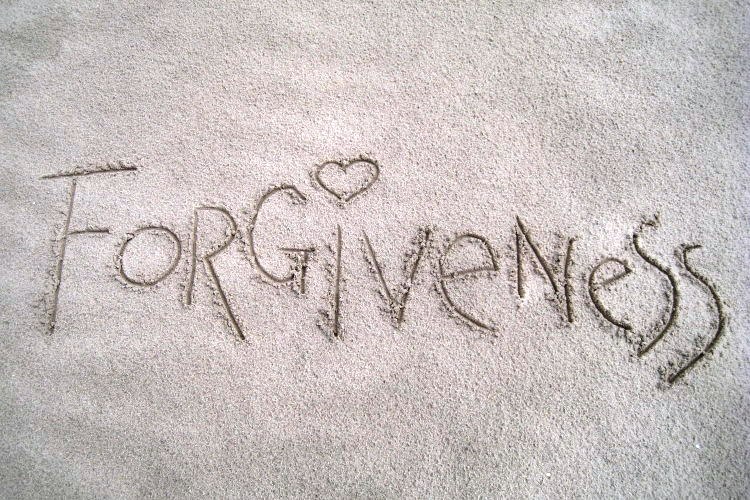“Your sins are forgiven”
2nd April 2020

Mark Rostron continues his exploration of the subject of forgiveness – especially how much and at what point repentance comes into play – and looks at Jesus’ personal dealings with people requiring forgiveness
Perhaps the most famous ‘Your sins are forgiven’ comes in Luke 5:20, when a paralysed man is brought to Jesus by his friends. Obviously, we don’t know what went on between the man and his friends beforehand, but there is little to suggest that this was a man who had begged his friends to bring him to Jesus because he wanted to turn his life around. It may well have been his friends’ idea, and indeed, Luke says that Jesus responds to their faith. So, faith rather than repentance, and a collective rather than individual act. I think the best we can say is that the friends saw Jesus as an answer to their need, and they did everything they could to get to Him. That’s good. That’s very good. But it’s not repentance in the way a lot of Christians understand it
It is the response of others to Jesus’ statement, however, which has given the passage a lot of its fame. Forgiveness doesn’t go down too well, even today. But note the comparison Jesus makes in his response. "Which is easier: to say, Your sins are forgiven, or to say, Get up and walk?" The issue at stake here is blasphemy, or the right to do and say only things God can do or say
We have already seen Jesus give his disciples the authority to forgive sins, but also in John’s gospel is the promise “whoever believes in me will do the works I have been doing, and they will do even greater things than these, because I am going to the Father” (John 14:12). Jesus tells his followers to do the things He has been doing, so let us ask the church the question He asked – “Which is easier: to say, ‘Your sins are forgiven’ or to say ‘Get up and walk?’”
I rather think that an honest response from some would be “Er… we’ll take the healings, Lord. They look good, they’re good for morale and they make us all feel good. They’re also a heck of an advertising tool. The forgiveness thing; well, that’s a bit awkward. We’re not quite sure who we’re allowed to forgive, and we’d hate to let just anyone into the Kingdom without due process?” Sometimes forgiveness seems just a miracle too far. Even though verse 26 shows the crowd giving thanks to God for the ‘remarkable things’ they have seen, which may include more than the physical healing
The woman caught in adultery and brought to Jesus by the teachers and Pharisees (John 8) gives him a perfect opportunity to point out the hypocrisy of their condemning attitude. But what does He say to the woman herself when her accusers are gone? He establishes with her that no-one has condemned her and then says (in John 8:11) “Neither do I. Go and sin no more”. Jesus refuses to condemn her. He refuses to give her the response her sin deserves. In other words, he forgives her. And then he tells her not to continue to sin. In other words, to turn her life around. To repent. Could forgiveness actually be one of the best ways of giving rise to a repentant attitude?
This appears to be echoed in the story of Zacchaeus, for when Jesus invites himself to the tax collector’s house, and does not pronounce the condemnation that those around Jesus appeared to expect, Zacchaeus announces he will repay any wrong he has done “four times the amount” (Luke 19:8). He demonstrates at least an outward showing that he has accepted Jesus’ forgiveness of him
With the other two it is not so clear. The paralysed man could have used his new-found mobility to commit all sorts of crimes and the woman may have gone straight back to the arms of another woman’s husband. Would they have remained forgiven had they done so? Presumably the door would always be open for them to repent seventy times over (Matthew 18:22), but the point is that repentance is important, and I would assume that one of the best ways to not be forgiven is not to want to be.
Jesus talks about this quite clearly in Luke 18:9-14 (the parable of the Pharisee and the tax collector), although it is interesting that the brunt of the criticism falls, not on the social degenerates (what would be the drug taking, promiscuous, knife wielding lower classes of our generation) but on the established religious leaders of the day
One of the reasons we are to love one another is because it is a witness to the world. It is the spreading of the gospel. But what is it that Christians do that is different to how the morally upright people of the world act? Because we surly have to recognise that there are a lot of good things done by those of different religions or no religion
In response to this, I think of those people who have been able to offer full and heartfelt forgiveness to terrorists or suchlike who have destroyed their lives by the murder of their loved ones. I believe I have seen this two or three times, and each time the forgiver has been a Christian. Now I’m not saying that people of no faith or a different faith cannot dispense this amazing gift, but it does seem that Christians do have a bit of a head start if they choose to use it
One of the accusations levelled at a progressive - dare I say liberal - form of Christianity is that it is following the ways of the world, essentially making it easier and less confrontational. Not this forgiveness. The world despises forgiveness because it goes against the idea that your rights and sense of self have been earned and cannot be eroded; and for them to be breached would leave you devalued as a person
As Christians, we know that we have a value that can never be diminished, and it is not based on what we have done but on what we have been given. We are in the perfect place to dispense a forgiveness that draws attention to itself and may even provide opportunity for repentance
It may be relevant to note that some of Jesus’ hardest teaching (to Nicodemus in John 3, to the rich young ruler in Mark 10 and the Good Samaritan parable in Luke 10) is in response to questions along the lines of ‘What must I do?’ People who think they can still ‘do’ need to be shown their need to repent. People who are forgiven experience a living example that what they receive is not what they deserve.
I still don’t know if the correct translation of Luke 24:47 is “repentance and” or “repentance for” forgiveness of sins. But I do know that Jesus wants us to forgive, that his forgiveness and acceptance of people led them to change their lives, and that forgiveness is still a life changing force today
So, if we are holding back on our forgiveness while we wait for signs of repentance, maybe we are not so much keeping the kingdom pure as keeping it small, and I’m not sure that was ever Jesus’ intention
the above image is courtesy of Bente Boe from Pixabay.com
this article also appeared on Network Norfolk

Mark Rostron was a support worker for about nineteen years (physical and learning disabilities and mental health), and is now a writer and carer for his wife. He lives in Gorleston and worships at St Mary Magdalene Church
The views carried here are those of the author, not of Network Yarmouth, and are intended to stimulate constructive and good-natured debate between website users
We welcome your thoughts and comments, posted below, upon the ideas expressed here
Click here to read our forum and comment posting guidelines
|